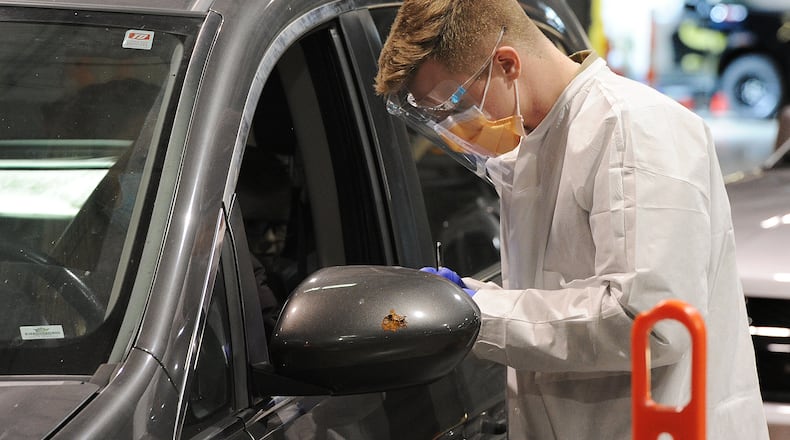Local health care systems faced changes at the executive level, including three executives leaving Kettering Health within a month of one another. Doctors and experts paid renewed attention to children’s mental health as they returned to classes in the fall, bringing with them stress that was pushing many kids to a crisis point.
Here is a summary of the year in health care news in the Dayton region.
COVID surge
In January, the Ohio National Guard redeployed more than 400 servicemembers from northeast Ohio to the Dayton, Cincinnati and southern Ohio region during a COVID-19 surge. This surge, caused by spread of the Omicron variant, peaked in late January and early February. It saw over 2,000 servicemembers deployed in Ohio to aid hospital facilities. Miami Valley Hospital was one of the earliest facilities across the state to receive support from the Ohio National Guard.
Opioid settlement
Local governments this year created the groundwork to dole out a historic settlement over the opioid crisis. Ohio had forged an $808 million agreement in 2021 with the three largest distributors of opioids, Cardinal Health, McKesson and AmerisourceBergen. While the money doesn’t add up to the the toll of the massive public health crisis, it is intended to help with some of the ongoing damage. From 2010 to 2019, opioid overdoses claimed the lives of more than 23,700 Ohioans, with countless others having had their lives torn apart by opioid addiction in other ways.
Abortion law debate
In late June, the United States Supreme Court overturned the constitutional right to abortion, allowing individual states to ban the procedure or impose heavier regulations on it. The decision erased a 7-2 decision in 1973 by a conservative court that ruled a woman’s decision to have an abortion during the first three months of her pregnancy must be left to her and her doctor. The Dayton Daily News took a closer look at what we know so far, what could happen next, and how people could be affected.
Youth mental health concerns
The concern for and focus on children’s mental health grew before and after the summer months. An analysis from the U.S. Centers for Disease Control found more than 4 out of 10 U.S. high school students said they felt persistently sad or hopeless during pandemic. Behavioral health experts recommended focusing on re-engaging teens to improve their mental health. As children returned to classes in the fall, kids were facing full mental loads that had doctors encouraging families to provide their children with support.
COVID still with many
In September, sufferers of long COVID detailed struggling to fit this new chronic illness into their old routines, as many are having trouble working, doing household chores, or keeping up with hobbies. Individuals with long or chronic COVID-19 are continuing to experience symptoms of the virus weeks, months, or even longer after initially catching the illness. The CDC estimates approximately 30% of people hospitalized for COVID have also had to deal with long COVID. For those who were not hospitalized, the CDC estimates about 13.3% of COVID sufferers have had one month or more of long COVID symptoms, along with about 2.5% with three months or more of long COVID. Treatment options also remain scarce.
Childhood vaccine investigation
In October, the Dayton Daily News analyzed data from the Ohio Department of Health regarding a growing moral opposition childhood immunizations. Hesitancy regarding the COVID-19 vaccine rollout last year coincided with an increasing number of parents filing moral or religious exemptions to their children entering kindergarten with established, required vaccines against diseases like measles and polio, the Dayton Daily News investigation found. At 14 elementary schools in the region, at least 10% of kindergarteners’ parents or guardians opted them out of getting required vaccines due to religious or moral objections during the 2021-2022 school year, according to new data from the Ohio Department of Health analyzed by the Dayton Daily News. The increases exceed state averages, and are more than those districts saw prior to the pandemic.
RSV surge
Also in October, children’s hospitals across the state saw large volumes of pediatric patients hit with cases of RSV, overwhelming hospitals for weeks to follow. Dayton Children’s Hospital consistently saw beds fill up, leading the hospital to get creative in creating more space for children to be seen. Doctors typically see more cases of RSV in January and February, but instead, this year they saw an early surge in cases in October and November.
Hospital executives out
In November, Kettering Health named Michael Mewhirter as the health care system’s interim chief executive officer. This followed a previous announcement about the retirement of CEO Fred Manchur, who spent nearly 12 years in the role. The announcement regarding Manchur’s retirement also followed two other Kettering Health executives, Kettering Health President Wally Sackett and Chief Administrative Officer Terry Burns, leaving the organization in October. Manchur’s retirement will be effective Dec. 31, but he took a leave of absence in advance of his retirement.
Interim CEO looking forward
In December, Mewhirter sat down with the Dayton Daily News to discuss the health care system’s plans to stabilize the company’s workforce as it responds to industry changes in how patients seek care and the impact inflation and rising costs have on the company. In 2022, Kettering Health opened new locations in Oxford and Springfield. In 2023, Kettering Health has plans to open primary care expansions in Franklin, Centerville, and Wilmington.
Measles outbreak
Also in December, a measles outbreak in central Ohio spilled over to Dayton-region counties, infecting an infant in Clark County. The city of Columbus health commissioner, Dr. Mysheika Roberts, explained vaccine hesitancy and politicization of vaccines were fueling the outbreak. Myths surrounding the vaccine for measles also persisted, even though studies and doctors have said the vaccine is safe and effective. As of Wednesday, Dec. 28, there were 82 children in Ohio with the measles, 32 of whom were hospitalized.
About the Author

